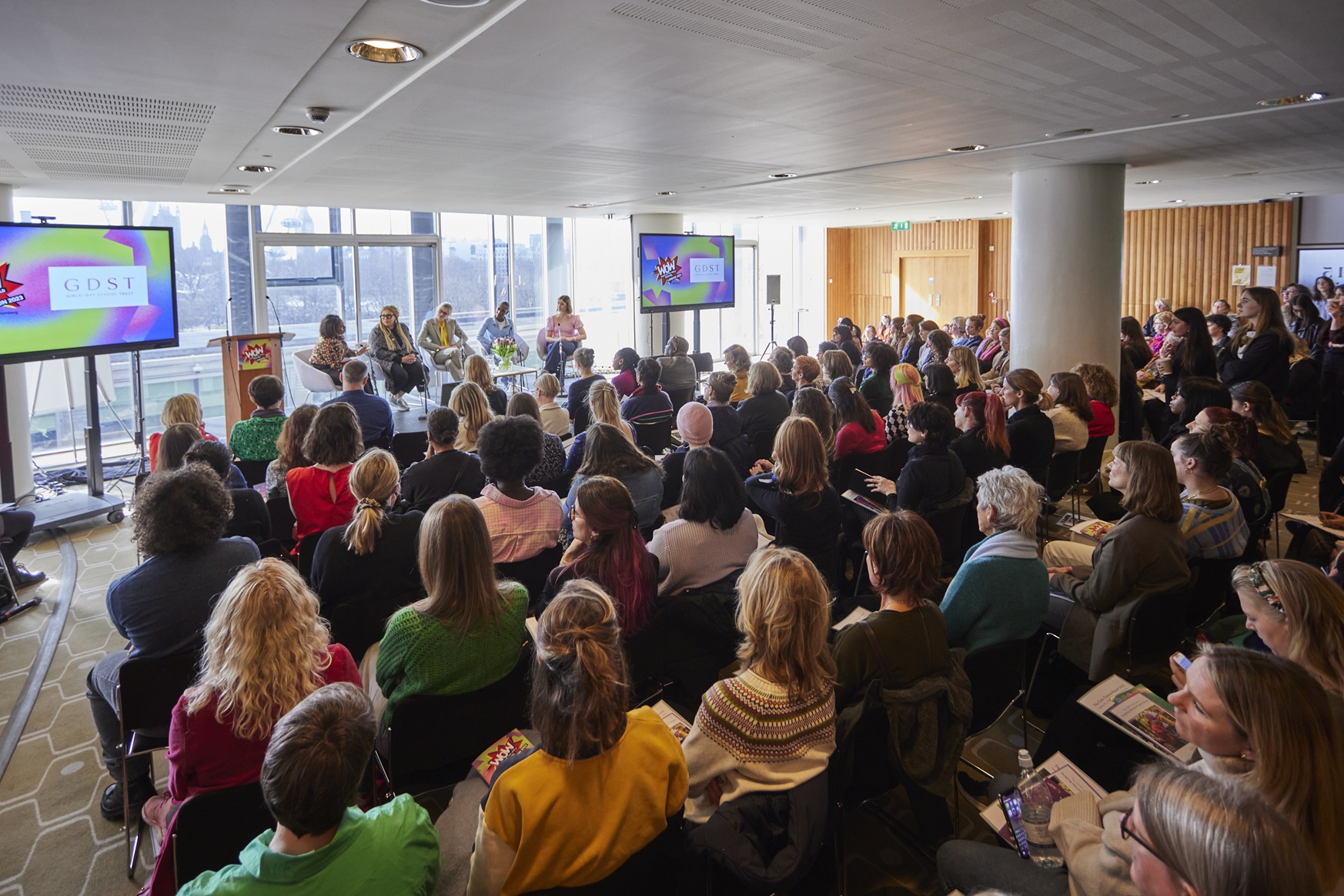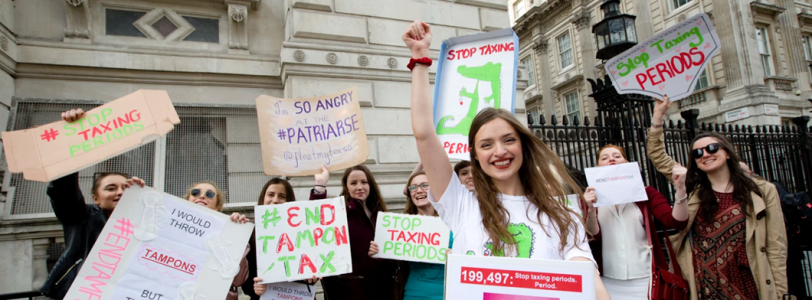Could you please introduce yourself to the reader?
My name is Laura, I’m an author, and I started a petition when I was a student to end tampon tax, the 5% luxury tax that was applied to all period products. After many years of campaigning, and plenty of failures along the way, we ended up getting around 317,000 signatures and support from major global figures like President Obama.
The campaign had two main successes. Firstly, the petition successfully lobbied the Government into establishing the Tampon Tax Fund, through which almost £100m was donated to female focussed charities. Secondly, the tampon tax was axed in 2021. We now have sister petitions in almost every continent across the world and countries like Tanzania, Japan, France, Germany and across the US. I’ve since had to start a new tampon tax petition, which you can sign here, lobbying retailers to lower the price of period products now the tampon tax has been axed and have launched the social enterprise, Sex Ed Matters.
Please tell us a little bit about your experience as an activist from the early stages to its progression to a bigger platform.
It was a whirlwind! I really didn’t expect it to happen. I grew up in Devon, which seemed like the furthest place from Westminster, and didn’t have any experience of campaigning. At the beginning, it was almost more enjoyable because it was unexpected and the small wins felt so valuable. Once the tampon tax petition reached hundreds of thousands of signatures, I realised how big of an issue period stigma and poverty was as they hold so many people back. You scratch the surface at the beginning, then the further you go you realise how much change needs to happen. Campaign failure can seem bigger because they’re a failure for all the people who signed the petition - it’s not just you anymore. But of course the campaigning journey is so rewarding. I would recommend to anyone who has a slight inkling to definitely start campaigning in whatever way suits you best because you really have no idea where it can lead.
How did the movement impact your career and future?
Starting the petition sparked everything. From there, I got way more involved in local politics and then some national politics. It snowballed because the more you speak to politicians, the better the petition gets, and the more people signed it. I think the petition really did show me that politics is a place for everyone and you can actually make changes if you set your mind to it.
You founded Sex Ed Matters. Can you tell us briefly what motivated you in this direction, and then elaborate on what you’ve learnt?
I started Sex Ed Matters because of my engagement with schoolchildren as part of my campaigning and activism. In doing that, I heard so much from students about how period stigma impacts them. Some children were talking about how they were trying to get pregnant because they don’t have access to period products and were too embarrassed to ask, and saw pregnancy as a solution. A headteacher emailed me last week to say that children are bleeding on the chairs every week because they don’t have access to products and feel they can’t ask. Stigma is also applied to so many broader topics like consent and sexuality. These topics are often never talked about in an empowering way. So I started my social enterprise to help deliver the empowering sex education everyone deserves through workshops and resources. Sex Ed Matters is, for me, another way to do activism through a social enterprise rather than a petition.

What do you think about how the major parties are planning to deal with sex ed issues and education more generally? What further policies would you like to see from them?
Ultimately, the Conservative Party in government at the moment have done a lot to hold sex education back. They did come out with the new sex-ed curriculum in 2019 which was so impressive. That was absolutely incredible, it was the first time it was mandatory that all schools teach this curriculum. So there are definitely Conservatives who support and believe in the power of sex education.
However, the current cabinet is constantly threatening to roll back sex education. They throw gender neutral toilets into the debate when they want to distract from what’s really going on. Very recently, the Women and Equalities Committee suggested changes to the sex-ed curriculum to include boys more and tackle harassment problems. The government ignored their recommendations which is really disheartening to see. I think tradition, an unwillingness to change and stigmas that play into these topics are some barriers that are preventing change at the moment. Unconscious or unmalicious homophobia is also playing a role.
Labour, on the other hand, have said they will ban conversion therapy immediately for everyone and they will pursue many more avenues to tackle violence against women and equalities. For example, they will promote the Women and Equalities Minister so they sit in on all cabinet meetings because equalities is important in relation to all other departments.
There are great advocates for sex-education on both sides, but as the policies currently stand, I believe Labour would deliver a more inclusive sex education curriculum.
Do you think all young people are likely to vote alike in the next general election, or is it more complicated?
I think young people are far more likely to question politics than previous generations and are more likely to pave their own path. They have a right to explore their own views, meaning they are more and more likely to vote for the party they believe in most rather than following the crowd. The internet has given them greater access to information than ever before, making them more informed and able to speak up for what they believe in and vote in line with their views, rather than simply follow the views of their parents. They can carve their own political identity, which is really exciting!
What prevents young people from voting in elections? This could be anything from political apathy to structural barriers.
I think there are two problems. Firstly, representatives in Parliament. There should be more young Parliamentarians or positions that young people can fill up. This would help young people to be seen in politics and therefore engage with it. Secondly, the voting system is so archaic. I’ve door-knocked a lot over the last 10 years and it’s so interesting how many young people say they want to vote online. They are living in the 21st century and the election system is living hundreds of years in the past. This obviously is really alienating, plus all the rules about IDs. It’s set up for a demographic that young people don’t identify with. Those things need to change if we truly want a democratic system.
Voting is just one method of political participation. How else would you recommend that young people engage in politics?
So many ways! Conversations with friends and family are really impactful. For example, I’ve been talking to my dad about feminism forever. He is 73 so has very different ideas about politics. The more you chat with people, the more you can learn from each other. Online politics is also really powerful, also following certain accounts on Instagram is really powerful too. I would encourage people to get involved in politics in whatever way feels the most meaningful and enjoyable to them.
What is your encouragement to young people that youth voice matters?
Be unapologetically ambitious. I often look back on my journey with the tampon tax campaign and question why I wasn’t more ambitious. We had so many failures over the tampon tax campaign, including Nigel Farrage backing us which was terrible! It meant that he made it into a Brexit issue which it didn’t need to be at all. Failures happen to everyone but we so often only hear about successful campaigns, meaning that people who experience the negative sides think they’re alone. Farrage’s backing actually turned into a success because it got David Cameron’s attention. He changed European law, meaning that any country can axe tampon tax if they want to. It was a really surreal change of events. Please go for it and aim for the change you want to see.
The Young Vote
Voice is on a mission to understand what you want from the next government, what issues are important to you at the next election and whether or not you're likely to vote. Whether you care about politics, or don't care at all,we want to hear from you.
To share your thoughts, participate in The Young Vote Survey. If you need extra incentive, it'll take under 10 minutes and you can win one of two £40 vouchers.









0 Comments